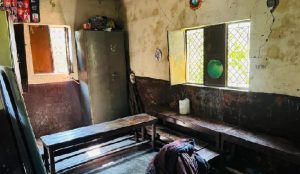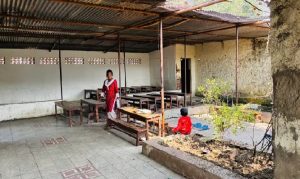15-12-2024
Bureau Report
NEW DELHI/ BHOPAL: Triveni Sonani starts her working day at 9am when she opens the gates of Oriya Basti School and welcomes the children of the neighborhood into the classroom for another day of learning.
On this sunny December morning, she begins by settling the children into their spots, instructing them to open their books as she prepares to teach them multiplication.
 The sole classroom is a simple space, a badly weathered tin roof and walls that are half-painted and partly unflustered. Most of the pupils sit on a few old wooden benches lining the walls, while some sit on thin mats on the concrete floor, their notebooks spread out in front of them, as sunlight streams through the gaps in the roof. Next door is a small but basic library called the “Anand Library” that the children can use?
The sole classroom is a simple space, a badly weathered tin roof and walls that are half-painted and partly unflustered. Most of the pupils sit on a few old wooden benches lining the walls, while some sit on thin mats on the concrete floor, their notebooks spread out in front of them, as sunlight streams through the gaps in the roof. Next door is a small but basic library called the “Anand Library” that the children can use?
As the lesson progresses, sounds of motorbikes revving, stray cows mooing and vendors calling out their wares drift into the room, mixing with the hum of children reading aloud. “They love this part of the day,” says Sonani, the school’s only teacher. Her gaze turns to the children and a mural they have painted on the crumbling wall, a rising sun, its rays a seeming symbol of hope in a community burdened by hardship. For decades, Oriya Basti has struggled in the shadow of the Bhopal gas tragedy, with little done to improve the lives of its people.
December marks the 40th anniversary of the world’s deadliest industrial disaster, which forever changed the lives of thousands in this community. Just 4km (2.5 miles) from Oriya Basti, a small community in Bhopal, sits the now-abandoned Union Carbide factory, where a leak of methyl isocyanate gas on the night of December 2 to December 3, 1984 killed more than 25,000 people and left at least half a million with lasting health issues.
Four decades after the disaster, justice remains elusive. No senior company executives of the US chemicals company have been held accountable. In 2010, seven Indian managers, including Keshub Mahindra, the then-chairman of the company’s Indian arm, were found guilty of causing death by negligence. They were fined the equivalent of $2,100 each and sentenced to two years in prison. Bu, they were immediately released on bail and never served time.
 The local communities worst affected by the tragedy have largely been left to fend for themselves ever since.
The local communities worst affected by the tragedy have largely been left to fend for themselves ever since.
In Oriya Basti, the lanes are still full of potholes, turning into slushy messes during the rain. Houses are made of flimsy tin sheets and old bricks, their walls cracked and stained with damp. Open drains run alongside the streets, offering little protection from diseases that the already weak healthcare system in the area cannot handle.
Power cuts are frequent, and clean water is a rare luxury, often arriving in tanker trucks that see families scrambling to fill their buckets.
Oriya Basti school also fondly known as the “barefoot school” because many of its children attend without slippers or shoes, as their families cannot afford to buy them is one chink of light to have come out of the disaster. “Oriya Basti School was founded with the vision of empowering the underserved. It played an important role in ensuring that the children of gas tragedy survivors did not become another casualty of the disaster,” says Sonani.
Currently, about 30 children, aged 6 to 14, attend. The school was founded in 2000 by the Sambhavna Trust, a charity established in 1995 to support the gas leak survivors. Over the years, the school has educated about 300 children.
The school is supported mainly through royalties from the book about the catastrophe, Five Past Midnight in Bhopal by Dominique Lapierre, along with donations from individuals.
 Pressmediaofindia
Pressmediaofindia




